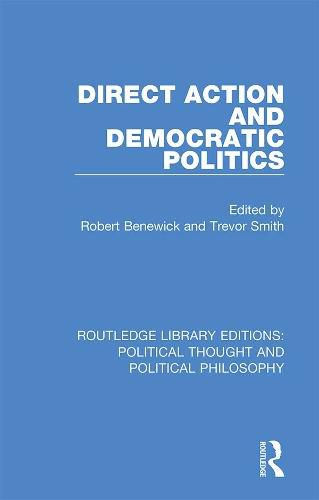Readings Newsletter
Become a Readings Member to make your shopping experience even easier.
Sign in or sign up for free!
You’re not far away from qualifying for FREE standard shipping within Australia
You’ve qualified for FREE standard shipping within Australia
The cart is loading…






First published in 1972. Militant protest is not new to British politics, but the widespread recourse to direct action, in Britain and abroad, is unprecedented. This book was the first comprehensive examination of contemporary protest in the British context. The contributors represented leading agencies of protest as well as those academics who had made this phenomenon their special concern. The result is a unique blend of direct experience and objective reflection.
The first part of the volume covers the theoretical and historical dimensions of protest, and is followed by a detailed consideration of specific issues (Ulster, race, the Bomb, students and community action). An analysis is then made of the reaction of the State to such protest through legislative and administrative channels. The final part shows the intermediary roles of political parties, MPs, the NCCL and the mass media. The book concludes with a critical examination of the interaction between protest and representative democracy and the implications which arise from it.
Students of politics and sociology as well as political activists of all shades of opinion will find this book essential to an understanding of the bases of protest movements.
$9.00 standard shipping within Australia
FREE standard shipping within Australia for orders over $100.00
Express & International shipping calculated at checkout
First published in 1972. Militant protest is not new to British politics, but the widespread recourse to direct action, in Britain and abroad, is unprecedented. This book was the first comprehensive examination of contemporary protest in the British context. The contributors represented leading agencies of protest as well as those academics who had made this phenomenon their special concern. The result is a unique blend of direct experience and objective reflection.
The first part of the volume covers the theoretical and historical dimensions of protest, and is followed by a detailed consideration of specific issues (Ulster, race, the Bomb, students and community action). An analysis is then made of the reaction of the State to such protest through legislative and administrative channels. The final part shows the intermediary roles of political parties, MPs, the NCCL and the mass media. The book concludes with a critical examination of the interaction between protest and representative democracy and the implications which arise from it.
Students of politics and sociology as well as political activists of all shades of opinion will find this book essential to an understanding of the bases of protest movements.